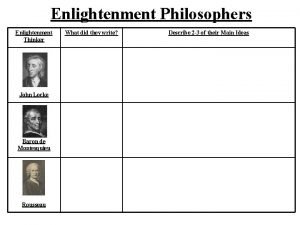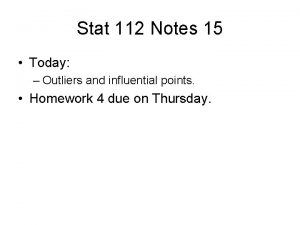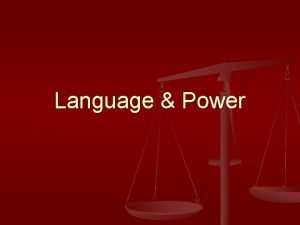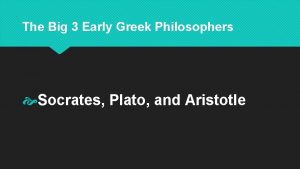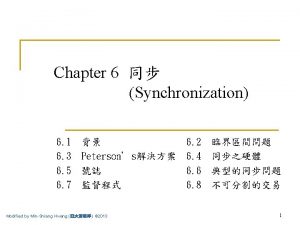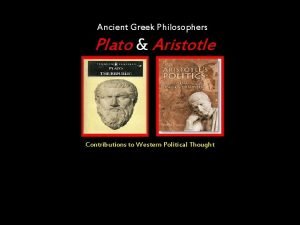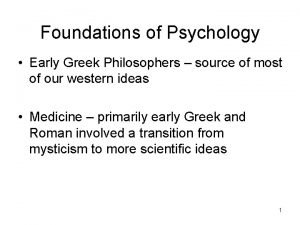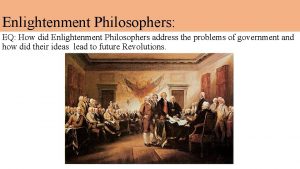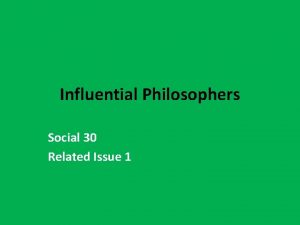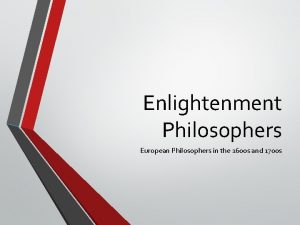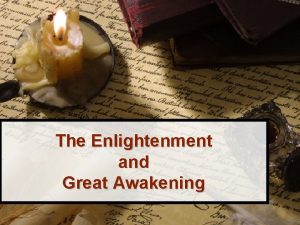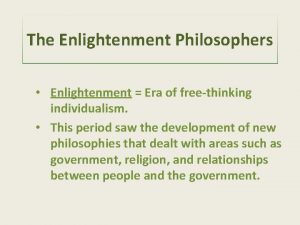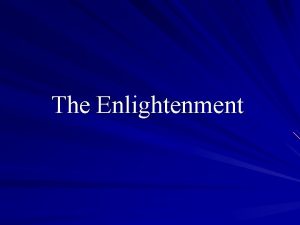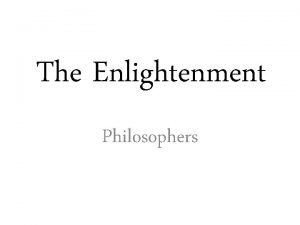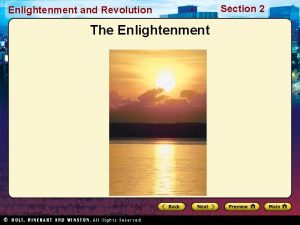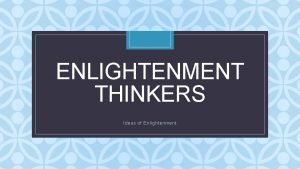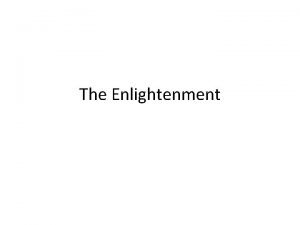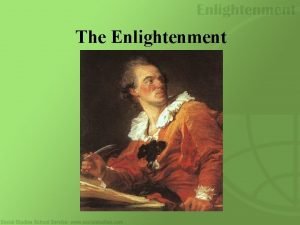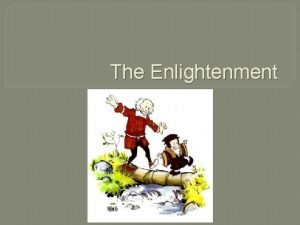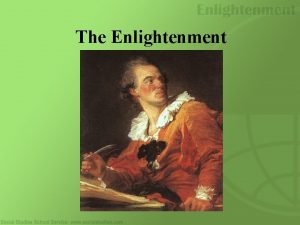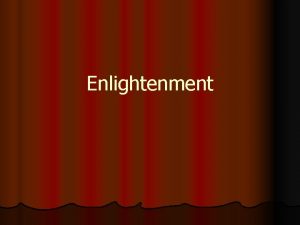POLITICS and the ENLIGHTENMENT PHILOSOPHERS INFLUENTIAL ENLIGHTENMENT PHILOSOPHERS

















- Slides: 17

POLITICS and the ENLIGHTENMENT PHILOSOPHERS

INFLUENTIAL ENLIGHTENMENT PHILOSOPHERS 1. 2. 3. 4. 5. Thomas Hobbes (1588 – 1679) John Locke (1632 – 1704) Jean-Jacques Rousseau (1712 – 1778) Baron de Montesquieu (1689 – 1755) Voltaire (1694 – 1778)

THOMAS HOBBES His Beliefs • In nature, people were cruel, greedy and selfish. They would fight, rob, and oppress one another. • To escape this people would enter into a social contract: they would give up their freedom in return for the safety and order of an organized society. • Therefore, Hobbes believed that a powerful government like an absolute monarchy was best for society – it would impose order and compel obedience. It would also be able to suppress rebellion.


THOMAS HOBBES His Impact • His most famous work was called Leviathan. • Hobbes has been used to justify absolute power in government. • His view of human nature was negative, or pessimistic. Life without laws and controls would be “solitary, poor, nasty, brutish, and short. ”

JOHN LOCKE His Beliefs • Believed in natural laws and natural rights. • We are born with God-given rights of life, liberty, and property. • Rulers / governments have a responsibility to protect the natural rights of the people it governs. • If a government fails ito protect natural rights, people have the right to overthrow that government. • (Locke liked the English monarchy where laws limited the power of the king).


John Locke His Impact • Locke’s ideas influenced Thomas Jefferson more than anything else when Jefferson wrote the US Declaration of Independence in 1776. • Locke justified revolution in the eyes of the Founding Fathers. • Locke also influenced later revolutions in France (1789) and in many other places in the world in the 19 th Century.

JEAN-JACQUES ROUSSEAU His Beliefs • People are basically good but become corrupted by society (like the absolute monarchy in France). • For Rousseau, the social contract was the path to freedom: people should do what is best for their community. • The general will (of the people) should direct the state toward the common good. Hence, the good of the community is more important than individual interests.


JEAN-JACQUES ROUSSEAU His Impact • His most famous work was The Social Contract. • JJR questioned authority - absolute monarchy and religion. • JJR was passionate, he hated political and economic oppression. • Influenced later revolutionaries, both middle class and socialist.

BARON DE MONTESQUIEU His Beliefs • He strongly criticized absolute monarchy and was a voice for democracy. • Separation of Powers - the best way to protect liberty was to divide the powers of government into three branches: legislative; executive; and judicial. • Checks and Balances – each branch of government should check (limit) the power of the other two branches. Thus, power would be balanced (even) and no one branch would be too powerful.


MONTESQUIEU His Impact • His first book, The Persian Letters, ridiculed the absolute monarchy and social classes in France. He also wrote The Spirit of the Laws. • Montesquieu’s ‘separation of powers’ and ‘checks and balances’ greatly influenced James Madison and the other framers of the US Constitution. These ideas are at the core of American government to this day.

VOLTAIRE His Beliefs • Advocated freedom of thought, speech, politics, and religion. • Fought against intolerance, injustice, inequality, ignorance, and superstition. • Attacked idle aristocrats, corrupt government officials, religious prejudice, and the slave trade. • He often had to express his views indirectly through fictional characters because he lived in an absolute monarchy in France.


VOLTAIRE His Impact • Wrote the famous novel Candide • Voltaire often used a razor sharp humor and cutting sarcasm in his writings. • He was imprisoned in the Bastille in Paris and exiled because of his attacks on the French government and the Catholic Church. • Voltaire’s books were outlawed, even burned, by the authorities.
 Montesquieu ideas enlightenment
Montesquieu ideas enlightenment Outliers and influential points
Outliers and influential points Instrumental power meaning
Instrumental power meaning Europe's physical features
Europe's physical features Christian louboutin louis benech
Christian louboutin louis benech Event philosophy
Event philosophy Big 3 of philosophy
Big 3 of philosophy Sparta physical education
Sparta physical education Who are the big three in greek philosophy
Who are the big three in greek philosophy Greek philosophers ethics
Greek philosophers ethics Kierkegaard antihegelismo
Kierkegaard antihegelismo Realism teaching philosophy
Realism teaching philosophy Monitor solution to dining philosophers
Monitor solution to dining philosophers Classic problems of synchronization
Classic problems of synchronization Socrates plato and aristotle worksheet answer key
Socrates plato and aristotle worksheet answer key Color theory worksheets
Color theory worksheets Ancient greece jeopardy
Ancient greece jeopardy Early greek philosophers in psychology
Early greek philosophers in psychology
